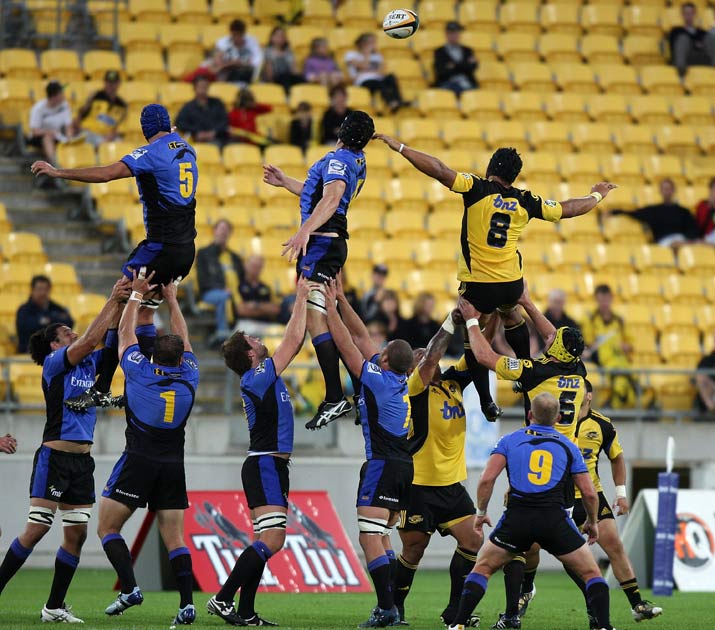Peter Bills: Dwindling southern hemisphere crowds must be addressed

The growing concern behind the state of the game across the southern hemisphere is an alarming contrast with the Six Nations tournament, which resumes this weekend.
Try buying a ticket for the big matches of the latter, such as Wales v France in Cardiff this Friday night, or England v Ireland at Twickenham on Saturday. Apart from the ticket touts, you have little hope of finding a source.
What is more, it is increasingly unusual to be able to get seats, certainly at the last minute, for the major Heineken Cup matches. And in France, when Paris-based Stade Francais switch one of their home games in the Top 14 domestic league from Stade Jean Bouin to the Stade de France, raising the potential capacity from around 20,000 to 80,000, they virtually sell out the Test venue.
Now contrast all that with what is going on right across the southern hemisphere. This year's Super 14 started a couple of weekends ago and already, vast swathes of empty terraces and vacant seats have been discerned at most grounds. Anyone anywhere can walk up at the last moment and buy a ticket.
The trouble is, in many cases, those tickets are too expensive for the local population in these challenging economic times. People under the cosh financially cannot justify spending anything between South African Rand 800 and 1000 (£75 to £90) a night on a rugby game for themselves and their families. So a lot don't go.
Nor is this a difficulty confined solely to Super 14 games. Last year's Tri-Nations Test matches were seriously difficult to sell, especially in New Zealand and Australia. The Kiwis don't like the night games, which are insisted upon by TV, so a lot stay at home. If supporters are travelling, say from Wellington or Dunedin to Christchurch, the 7.35p.m. kick-off usually means they have to build into their cost factor an overnight stay. Many more won't do that so unloading the tickets becomes even harder.
Across the Tasman, Australian rugby officials have a huge challenge on their hands from other sports and the Wallabies' series of defeats last year - they lost five of six games at one time to New Zealand and South Africa – did not help. Aussies like winners; they don't rush to buy seats to see losing teams, unlike, say, supporters in England and Ireland.
So you put all this together and you have a problem. The game is absolutely booming in the northern hemisphere, not least because of the population numbers. When you can draw from a population figure of maybe 65 million (the Government lost count years ago) which is now the case in the UK, you've got a pretty decent chance of selling out a 25,000 or even 80,000 stadium. Much the same applies in Paris, or Marseille (capacity 60,000).
So what can the game do about this worrying imbalance. For a start, it can start to become a lot more tolerant and understanding of other countries' difficulties and possible plans to ease those concerns. For example, the ELVs, mooted in the last two years, were an attempt to speed up the game and make it more attractive to a wider audience.
The game in the southern hemisphere is faster, there's no doubt about it. Former New Zealand All Black Carlos Spencer, who has just joined South African Super 14 outfit the Lions, based in Johannesburg, said as much recently. He claimed much of the rugby played in the northern hemisphere was poor. A pity he took so long to find that out, but then doubtless all the money he earned from Northampton and Gloucester helped soothe his conscience.
Nevertheless, when the ELVs were suggested to the northern hemisphere countries, they voted against them even though some had not even trialled them at a serious level. That kind of blinkered thinking is an expression of selfishness which does the game no good.
If rugby union falls apart in Australia in the face of the serious, unrelenting challenges from other sports, is that going to benefit the northern hemisphere? Not in my book. If the New Zealand Rugby Union is so short on cash it cannot prevent most of its best players heading overseas, will that be good for the game in that country? Of course not...
This game sold itself long ago on the premise of being a worldwide sport, one that pitched countries of opposing hemispheres against each other in classic sporting contest. I have no doubt Wales v France, England v Ireland and Italy v Scotland this coming weekend will be fascinating encounters.
But if more consideration is not given to countries who don't have 70,000 to 80,000 spectators every time they open the doors of their main stadium, then we might end up being fed a non-stop diet of such 6 Nations matches, to the exclusion of much else.
That can't be in anyone's interests.
Join our commenting forum
Join thought-provoking conversations, follow other Independent readers and see their replies
Comments
Bookmark popover
Removed from bookmarks